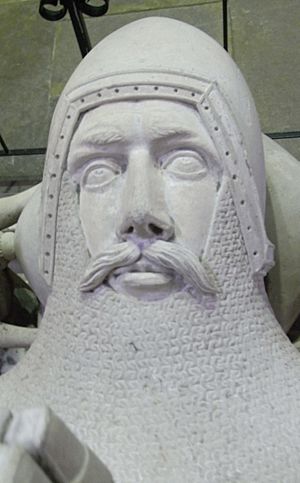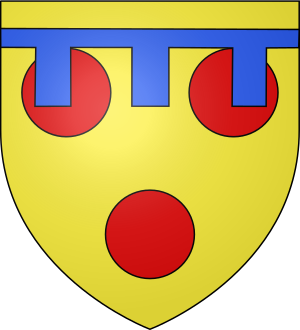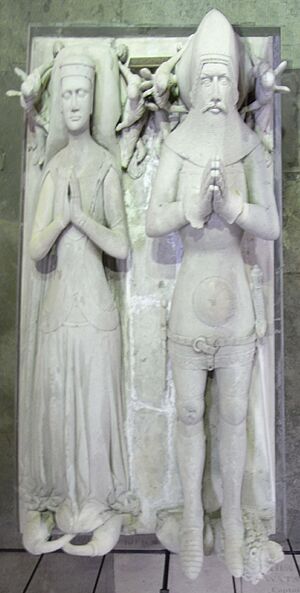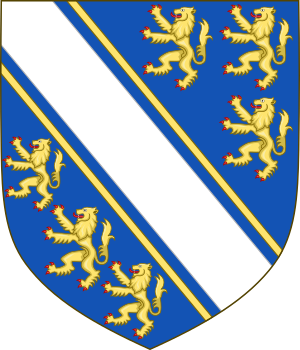Hugh de Courtenay, 2nd/10th Earl of Devon facts for kids
Quick facts for kids
Hugh de Courtenay
|
|
|---|---|
| 2nd/10th Earl of Devon | |

A statue (restored) of Hugh de Courtenay, 2nd/10th Earl of Devon, in Exeter Cathedral
|
|
| Born | 12 July 1303 |
| Died | 2 May 1377 (aged 73) |
| Noble family | Courtenay |
| Spouse(s) | Margaret de Bohun |
| Issue | Sir Hugh Courtenay, KG Thomas Courtenay Sir Edward Courtenay Robert Courtenay William Courtenay, Archbishop of Canterbury Sir Philip Courtenay Sir Peter Courtenay, KG Humphrey Courtenay Margaret Courtenay (the elder) Elizabeth Courtenay Katherine Courtenay Anne Courtenay Joan Courtenay Margaret Courtenay (the younger) ______ Courtenay (7th daughter) ______ Courtenay (8th daughter) ______ Courtenay (9th daughter) |
| Father | Hugh de Courtenay, 1st/9th Earl of Devon |
| Mother | Agnes de Saint John |
Sir Hugh de Courtenay, 2nd/10th Earl of Devon (born 12 July 1303 – died 2 May 1377) was an important English nobleman. He was also known as the 2nd Baron Courtenay. He owned large areas of land in Devon, including Tiverton Castle and Okehampton Castle.
Hugh de Courtenay played a big part in the Hundred Years War, serving King Edward III. This was a long series of conflicts between England and France. The way we count his title (2nd or 10th Earl) depends on how you look at the history of the earldom. Some historians see it as a new title, while others see it as a return of an older one.
Contents
Who Was Hugh de Courtenay?
Hugh de Courtenay was born on 12 July 1303. He was the second son of Hugh de Courtenay, 1st/9th Earl of Devon. His mother was Agnes de Saint John.
He became the Earl of Devon when his father passed away in 1340. His older brother, John de Courtenay, was a church leader and did not marry. Because of this, John could not inherit the earldom, even though he inherited some family lands.
His Life and Work
In 1325, Hugh de Courtenay married Margaret de Bohun, Countess of Devon. Through this marriage, he gained control of the manor of Powderham. Margaret later gave Powderham to one of their younger sons, Sir Philip Courtenay. Philip's family still lives there today.
In 1327, Hugh was made a knight banneret. This was a special type of knight who could lead his own soldiers into battle. In 1333, he and his father fought together at the Battle of Halidon Hill.
In 1337, he was called to join the Parliament, which meant he became a Baron. Two years later, in 1339, he and his father helped stop a French attack on Cornwall, pushing the French back to their ships.
When his father died in 1340, Hugh officially became the Earl of Devon. He took control of all his family's lands in 1341.
Serving the King
In 1342, the Earl joined King Edward III's journey to Brittany. He was excused from joining the King on a trip overseas in 1347 because he was not well. This suggests that his eldest son, Hugh Courtenay, might have been the one who fought at the famous Battle of Crecy in 1346.
In 1350, the King allowed the Earl to travel for a year. During this time, he helped build a monastery in London. In 1352, he was put in charge of Devon and Cornwall as a Joint Warden.
In 1361, Hugh and his wife inherited a lot of money and land from Margaret's brother, Humphrey de Bohun. This made them much wealthier.
Later Years and Legacy
Hugh de Courtenay played a clever role in the Battle of Poitiers in 1356. The Black Prince (King Edward III's son) sent Hugh to guard the army's supplies at the back. This turned out to be a very smart move. The long line of wagons and carts blocked a narrow bridge, stopping the French from escaping. Because of this defensive role, Hugh did not fight much in the main battle.
After his service, he retired with a full pension from the King. In 1373, he became the Chief Warden of the Royal Forests in Devon. This job brought him a good income. Even though he was not the richest Earl in England, he still had a group of 40 knights, squires, and lawyers working for him in Devon. He also owned properties in several other counties.
Hugh de Courtenay died in Exeter on 2 May 1377 and was buried in Exeter Cathedral on the same day.
Family Life
On 11 August 1325, Hugh de Courtenay married Margaret de Bohun, Countess of Devon. Margaret was born in 1311 and passed away in 1391. She was the eldest daughter of Humphrey de Bohun, who was the 4th Earl of Hereford. Margaret's mother, Princess Elizabeth, was a daughter of King Edward I.
Hugh and Margaret had a large family with eight sons and nine daughters:
- Sir Hugh Courtenay (died 1348): He was the eldest son and was expected to inherit the title. However, he died before his father. He had one son, Hugh Courtenay, who also died without children.
- Thomas Courtenay (born around 1329-1331): He became a church official in Crediton and Exeter.
- Sir Edward Courtenay (around 1331-1368/71): He also died before his father. He married Emeline Dauney, who brought many lands into the Courtenay family. Their son, Edward Courtenay, became the next Earl of Devon.
- Robert Courtenay.
- William Courtenay (around 1342 – 1396): He became the Archbishop of Canterbury, a very important church leader.
- Sir Philip Courtenay (around 1345 – 1406): He lived at Powderham Castle in Devon.
- Sir Peter Courtenay (died 1405): He was a Knight of the Garter. His family shield, showing the Courtenay and Bohun arms, can still be seen in Exeter Cathedral.
- Humphrey Courtenay: He died young without children.
- Margaret Courtenay (the elder) (born around 1328 – died 1395): She married John de Cobham.
- Elizabeth Courtenay (died 1395): She married twice.
- Katherine Courtenay (died 1399): She married Thomas Engaine.
- Anne Courtenay.
- Joan Courtenay: She married Sir John de Cheverston.
- Margaret Courtenay (the younger) (born between 1342 and 1350 – died after 1381): She married Sir Theobald Grenville II.
- Three other daughters whose names are not known.
 | Victor J. Glover |
 | Yvonne Cagle |
 | Jeanette Epps |
 | Bernard A. Harris Jr. |




